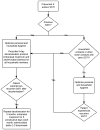Prevention of Recurrent Staphylococcal Skin Infections
- PMID: 26311356
- PMCID: PMC4552962
- DOI: 10.1016/j.idc.2015.05.007
Prevention of Recurrent Staphylococcal Skin Infections
Abstract
Staphylococcus aureus infections pose a significant health burden. The emergence of community-associated methicillin-resistant S aureus has resulted in an epidemic of skin and soft tissue infections (SSTI), and many patients experience recurrent SSTI. As S aureus colonization is associated with subsequent infection, decolonization is recommended for patients with recurrent SSTI or in settings of ongoing transmission. S aureus infections often cluster within households, and asymptomatic carriers serve as reservoirs for transmission; therefore, a household approach to decolonization is more effective than measures performed by individuals alone. Novel strategies for the prevention of recurrent SSTI are needed.
Keywords: Decolonization; MRSA; Pediatrics; Prevention; Skin infection; Staphylococcal vaccine; Staphylococcus aureus.
Copyright © 2015 Elsevier Inc. All rights reserved.
Figures

References
-
- Holt LE, Howland J, Holt LE, McIntosh R. Holt’s diseases of infancy and childhood; a textbook for the use of students and practitioners. 11. New York, London: D. Appleton-Century company; 1940.
-
- Hersh AL, Chambers HF, Maselli JH, Gonzales R. National trends in ambulatory visits and antibiotic prescribing for skin and soft-tissue infections. Arch Intern Med. 2008;168(14):1585–91. - PubMed
-
- Wertheim HF, Melles DC, Vos MC, van Leeuwen W, van Belkum A, Verbrugh HA, et al. The role of nasal carriage in Staphylococcus aureus infections. Lancet Infect Dis. 2005;5(12):751–62. - PubMed
-
- Faden H, Lesse AJ, Trask J, Hill JA, Hess DJ, Dryja D, et al. Importance of colonization site in the current epidemic of staphylococcal skin abscesses. Pediatr. 2010;125(3):e618–24. - PubMed
Publication types
MeSH terms
Substances
Grants and funding
LinkOut - more resources
Full Text Sources
Other Literature Sources
Molecular Biology Databases
Research Materials
Miscellaneous

